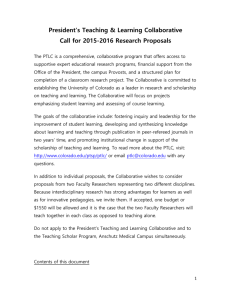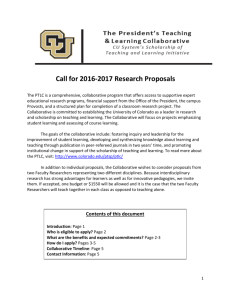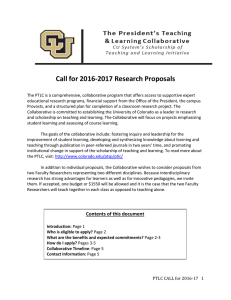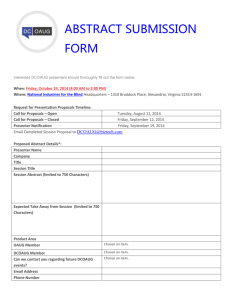President`s Teaching & Learning Collaborative Call for 2010
advertisement
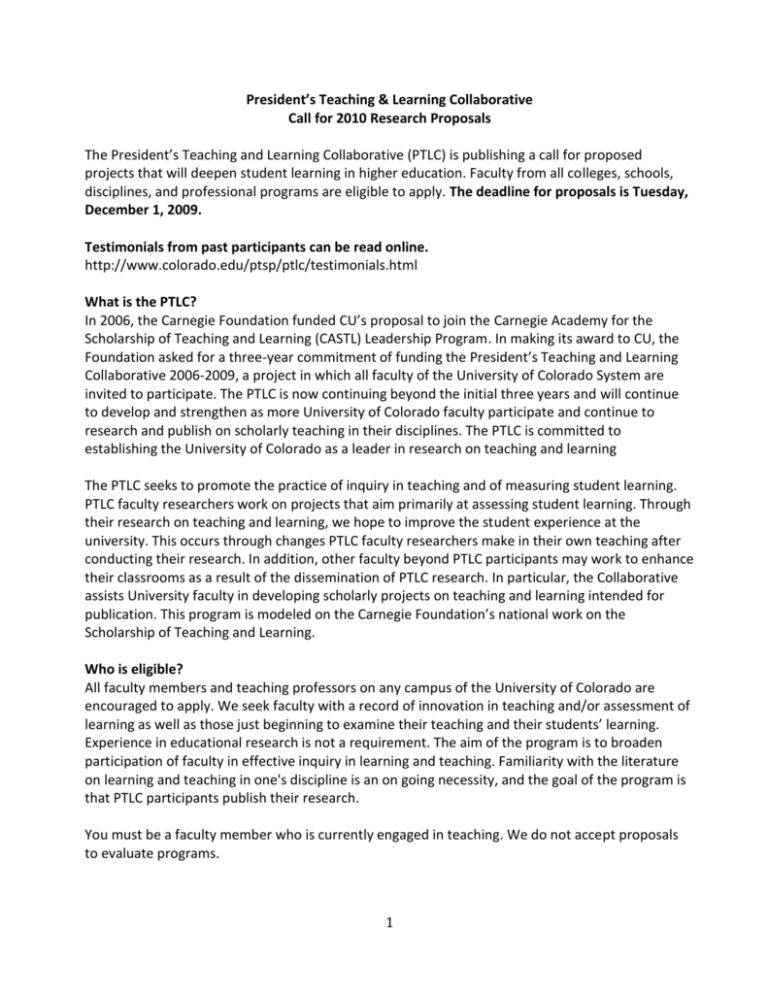
President’s Teaching & Learning Collaborative Call for 2010 Research Proposals The President’s Teaching and Learning Collaborative (PTLC) is publishing a call for proposed projects that will deepen student learning in higher education. Faculty from all colleges, schools, disciplines, and professional programs are eligible to apply. The deadline for proposals is Tuesday, December 1, 2009. Testimonials from past participants can be read online. http://www.colorado.edu/ptsp/ptlc/testimonials.html What is the PTLC? In 2006, the Carnegie Foundation funded CU’s proposal to join the Carnegie Academy for the Scholarship of Teaching and Learning (CASTL) Leadership Program. In making its award to CU, the Foundation asked for a three-year commitment of funding the President’s Teaching and Learning Collaborative 2006-2009, a project in which all faculty of the University of Colorado System are invited to participate. The PTLC is now continuing beyond the initial three years and will continue to develop and strengthen as more University of Colorado faculty participate and continue to research and publish on scholarly teaching in their disciplines. The PTLC is committed to establishing the University of Colorado as a leader in research on teaching and learning The PTLC seeks to promote the practice of inquiry in teaching and of measuring student learning. PTLC faculty researchers work on projects that aim primarily at assessing student learning. Through their research on teaching and learning, we hope to improve the student experience at the university. This occurs through changes PTLC faculty researchers make in their own teaching after conducting their research. In addition, other faculty beyond PTLC participants may work to enhance their classrooms as a result of the dissemination of PTLC research. In particular, the Collaborative assists University faculty in developing scholarly projects on teaching and learning intended for publication. This program is modeled on the Carnegie Foundation’s national work on the Scholarship of Teaching and Learning. Who is eligible? All faculty members and teaching professors on any campus of the University of Colorado are encouraged to apply. We seek faculty with a record of innovation in teaching and/or assessment of learning as well as those just beginning to examine their teaching and their students’ learning. Experience in educational research is not a requirement. The aim of the program is to broaden participation of faculty in effective inquiry in learning and teaching. Familiarity with the literature on learning and teaching in one's discipline is an on going necessity, and the goal of the program is that PTLC participants publish their research. You must be a faculty member who is currently engaged in teaching. We do not accept proposals to evaluate programs. 1 What kind of research does PTLC support? Central to the PTLC is creating and disseminating scholarly work in teaching and learning to contribute to scholarship and practice in and across fields. To this end, each scholar designs and undertakes an investigation aimed at deepening her or his understanding of, and practice related to an important issue in innovative learning. Several features for projects should be kept in mind: Proposed work should center on definitions, experiences, problems, and values related to effective teaching and learning as well as investigations of one’s own students and classroom practices. The focus of this work should be teaching and learning for understanding, exploring primarily the character and depth of student learning that results (or does not) from particular teacher practices. We look for attention to enduring, widely recognized issues and questions that have broad relevance or implications for student learning. Scholarship that advances understanding of such questions is more likely to find audiences. We also are interested in work that demonstrates a commitment to the personal and social development of students. Of further interest is work explicitly linked to established lines of research. Like other forms of scholarship, the scholarship of teaching and learning builds on work done by others. All proposals should review research related to the specific problem to be investigated. What are the invited themes for proposals for the 2010 PTLC cohort? We especially invite proposals with this theme. Factors that increase student success: studying variables that help students succeed in academic subjects or particular courses; innovations in course curriculum and instruction (e.g., reform mathematics teaching approach, individualized writing instruction, online instructional strategies) We also welcome proposals on the following themes. Educational experiences and identity: studying students who are practicing being a particular kind of professional (e.g., pharmacist, a nurse, a qualitative researcher) The value of reflection: studying reflective practices that are explicit components of coursework (e.g., reflection and student awareness, reflection and creativity, contemplative practices and educational experiences) Evaluation of long-term effectiveness: studying how classes or programs affect students in later classes, programs, or work settings (e.g., prerequisite courses on current performance, freshman seminar participation and student retention, academic degree and later work experience) Proposals falling outside these themes are also welcome. Do you have examples of proposals by past PTLC faculty researchers? Like many faculty, you may be curious about aspects of your teaching, but you may be uncertain as to how to investigate the effectiveness. All of the proposals from previous PTLC projects are posted on the web. If you browse through these, you may gain ideas about how to formulate your project. 2 You will also notice the variety of research projects the PTLC has supported. You can read all of the proposals of the 2009 cohort on the PTLC website. http://www.colorado.edu/ptsp/ptlc/proposals/ Examples of research projects: Anne Becher inquired, "Does error classification in short Spanish compositions help students avoid common errors on subsequent papers?" Kenneth Bettenhausen wanted to know "whether participation in freshman seminars increases student engagement, retention rates, and academic success." Alan Mickelson developed "an assessment methodology that can provide a running assessment of student development during an electrical and computer engineering course." What are the benefits? Faculty researchers will receive $800 to support a graduate or undergraduate research assistant. Requests for research assistant funds must be submitted by May 1, 2009. A travel proposal for $500 should be submitted for 2010 cohort researchers interested in travel support to present project results at a conference. PTLC and your Chancellor’s office will be involved in the final selection for travel awards. Proposals for travel will be considered by your Chancellor’s office only in the cohort year of your participation in the cohort. Faculty researchers will meet monthly as a cohort group. These meetings will include a presentation by an expert on a topic relevant to education research (e.g., IRB/HRC approval, literature searches, learning theory). In addition, faculty researchers will meet in small groups to discuss the progress of their research projects. Faculty researchers accepted into the PTLC should expect to meet regularly with coaches and mentors to define, clarify, or revise their research project as it evolves into a focused research project be completed during the fellowship year. The coach understands the Carnegie Foundation approach to enabling the scholarship of teaching and learning and offers aid as needed (e.g., shaping workable research questions, practical methods for exploratory research, and possible venues for presentation and publication.) The mentor understands the investigator’s discipline and has teaching experience in that field. The mentor helps the investigator develop and maintain the relevance of her or his work to the discipline. The researcher, coach, and mentor will meet as a team at least twice each semester to advance the researcher’s project. What commitments are expected of participants? The celebration of teaching and learning meeting to kick off the 2010 cohort will take place in late January 2010. The meeting will be held at the Anschutz Medical Campus of UC Denver. Progress report meetings will take place monthly and allow investigators, coaches, and mentors time to discuss scholarly work on teaching and learning in small groups, and to open their research questions and research methodologies to peer review. Meetings will be held at the Anschutz Medical Campus of UC Denver. 3 During your year of membership as a faculty research, the PTLC requires each participant to formally present their work on their respective campuses. Presentation includes departmental meetings and campus colloquia, among other venues. This spreads awareness of both your scholarship and of the PTLC. Publication in a journal or presentation at a conference (or notification of acceptance) is expected no later than December 2010. Faculty Fellows will receive recognition at the campus and departmental levels upon completion of their research in December 2010. Because the growth of the PTLC depends on investigators’ willingness to coach and mentor future PTLC investigators following their term in the program, each researcher is expected to participate as a coach or mentor in the following year. The Institutional Review Board/Human Research Committee process should be completed early in the program. This review may take up to six weeks depending on the proposed project. PTLC coaches, mentors, the director, and the coordinator may be consulted to assist in this process. Data collection should take place by the summer of 2010 to ensure time to analyze the data and write up the results. We thank the Carnegie Foundation for the Advancement of Teaching CASTL program for permission to adapt application materials. How do I apply? All application materials must be submitted electronically as attached Word documents to maryann.shea@colorado.edu no later than Tuesday, December 1, 2009. Please send the following all in a single Word document: 1. Cover sheet with the following information: a. Name b. Job Title and/or Academic Rank c. Institution d. College or School e. Department or program f. Discipline and/or professional field g. Campus address h. City, state, ZIP code i. Phone number j. Email address k. Title of your proposed project 2. Abbreviated Curriculum Vitae of no more than one page 3. Letter of proposal (no more than four pages double-spaced and paginated, with your name in the header of each page) answering these questions: a. What is the central question, issue, or problem you plan to explore in your proposed work? 4 b. Why is your central question, issue, or problem important, to you and to others who might benefit from or build on your findings? c. How do you plan to conduct your investigation? What sources of evidence do you plan to examine? What methods might you employ to gather and make sense of this evidence? d. How might you make your work available to others in ways that facilitate scholarly critique and review, and that contribute to thought and practice beyond the local? (Keep in mind that coaching will be available to help you develop these aspects of your proposal, so you need not feel you must present a finished project design at this time.) e. Include a literature review of the theory and effective teaching practice of the subject of your inquiry in order to locate your research in the literature preceding it. (The website, http://www.colorado.edu/ptsp/ptlc.html, offers expert advice on how to conduct a modest literature review.) f. What is your record of innovation in teaching and/or the assessment of learning? g. Are you able to attend the required meetings as specified in Section 5, What are the Benefits? h. Provide the name and contact information for someone who can serve as a mentor to you within the PTLC program. A mentor is a colleague in your discipline, broadly considered, who will help you develop your project. i. Can you suggest an appropriate coach for your project? A coach is a faculty member who has experience with educational research and can thus guide you in your research on teaching and learning. This is NOT a requirement but may increase your likelihood of acceptance. j. If your project is selected, are you willing to serve as a coach in PTLC in a future year? 4. A letter of nomination from department chair or unit head (adapted from the UC Denver School of Medicine) a. Chair’s contact information i. Current academic rank ii. Mailing address iii. Department iv. Phone v. Fax vi. E-mail b. Name of faculty member you are nominating c. Describe the role that the faculty member currently plays in the department, including current teaching load and service. d. Please indicate ways in which the candidate’s PTLC participation might benefit the department, including opportunities to share research results with peers and students. Review Process The PTLC will focus on projects emphasizing student learning at any educational level, undergraduate and above. Projects should be such that meaningful results can be obtained during the 2010 academic year and accepted in a peer-reviewed journal or for presentation at a conference. 5
